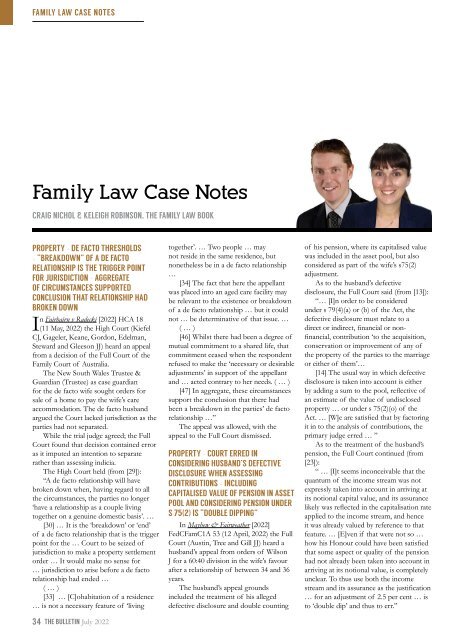LSB July 2022 LR
You also want an ePaper? Increase the reach of your titles
YUMPU automatically turns print PDFs into web optimized ePapers that Google loves.
FAMILY LAW CASE NOTES<br />
Family Law Case Notes<br />
CRAIG NICHOL & KELEIGH ROBINSON, THE FAMILY LAW BOOK<br />
PROPERTY – DE FACTO THRESHOLDS<br />
– “BREAKDOWN” OF A DE FACTO<br />
RELATIONSHIP IS THE TRIGGER POINT<br />
FOR JURISDICTION – AGGREGATE<br />
OF CIRCUMSTANCES SUPPORTED<br />
CONCLUSION THAT RELATIONSHIP HAD<br />
BROKEN DOWN<br />
In Fairbairn v Radecki [<strong>2022</strong>] HCA 18<br />
(11 May, <strong>2022</strong>) the High Court (Kiefel<br />
CJ, Gageler, Keane, Gordon, Edelman,<br />
Steward and Gleeson JJ) heard an appeal<br />
from a decision of the Full Court of the<br />
Family Court of Australia.<br />
The New South Wales Trustee &<br />
Guardian (Trustee) as case guardian<br />
for the de facto wife sought orders for<br />
sale of a home to pay the wife’s care<br />
accommodation. The de facto husband<br />
argued the Court lacked jurisdiction as the<br />
parties had not separated.<br />
While the trial judge agreed; the Full<br />
Court found that decision contained error<br />
as it imputed an intention to separate<br />
rather than assessing indicia.<br />
The High Court held (from [29]):<br />
“A de facto relationship will have<br />
broken down when, having regard to all<br />
the circumstances, the parties no longer<br />
‘have a relationship as a couple living<br />
together on a genuine domestic basis’. …<br />
[30] … It is the ‘breakdown’ or ‘end’<br />
of a de facto relationship that is the trigger<br />
point for the … Court to be seized of<br />
jurisdiction to make a property settlement<br />
order … It would make no sense for<br />
… jurisdiction to arise before a de facto<br />
relationship had ended …<br />
( … )<br />
[33] … [C]ohabitation of a residence<br />
… is not a necessary feature of ‘living<br />
34 THE BULLETIN <strong>July</strong> <strong>2022</strong><br />
together’. … Two people … may<br />
not reside in the same residence, but<br />
nonetheless be in a de facto relationship<br />
…<br />
[34] The fact that here the appellant<br />
was placed into an aged care facility may<br />
be relevant to the existence or breakdown<br />
of a de facto relationship … but it could<br />
not … be determinative of that issue. …<br />
( … )<br />
[46] Whilst there had been a degree of<br />
mutual commitment to a shared life, that<br />
commitment ceased when the respondent<br />
refused to make the ‘necessary or desirable<br />
adjustments’ in support of the appellant<br />
and … acted contrary to her needs. ( … )<br />
[47] In aggregate, these circumstances<br />
support the conclusion that there had<br />
been a breakdown in the parties’ de facto<br />
relationship …”<br />
The appeal was allowed, with the<br />
appeal to the Full Court dismissed.<br />
PROPERTY – COURT ERRED IN<br />
CONSIDERING HUSBAND’S DEFECTIVE<br />
DISCLOSURE WHEN ASSESSING<br />
CONTRIBUTIONS – INCLUDING<br />
CAPITALISED VALUE OF PENSION IN ASSET<br />
POOL AND CONSIDERING PENSION UNDER<br />
S 75(2) IS “DOUBLE DIPPING”<br />
In Mayhew & Fairweather [<strong>2022</strong>]<br />
FedCFamC1A 53 (12 April, <strong>2022</strong>) the Full<br />
Court (Austin, Tree and Gill JJ) heard a<br />
husband’s appeal from orders of Wilson<br />
J for a 60:40 division in the wife’s favour<br />
after a relationship of between 34 and 36<br />
years.<br />
The husband’s appeal grounds<br />
included the treatment of his alleged<br />
defective disclosure and double counting<br />
of his pension, where its capitalised value<br />
was included in the asset pool, but also<br />
considered as part of the wife’s s75(2)<br />
adjustment.<br />
As to the husband’s defective<br />
disclosure, the Full Court said (from [13]):<br />
“… [I]n order to be considered<br />
under s 79(4)(a) or (b) of the Act, the<br />
defective disclosure must relate to a<br />
direct or indirect, financial or nonfinancial,<br />
contribution ‘to the acquisition,<br />
conservation or improvement of any of<br />
the property of the parties to the marriage<br />
or either of them’…<br />
[14] The usual way in which defective<br />
disclosure is taken into account is either<br />
by adding a sum to the pool, reflective of<br />
an estimate of the value of undisclosed<br />
property … or under s 75(2)(o) of the<br />
Act. … [W]e are satisfied that by factoring<br />
it in to the analysis of contributions, the<br />
primary judge erred … ”<br />
As to the treatment of the husband’s<br />
pension, the Full Court continued (from<br />
[23]):<br />
“ … [I]t seems inconceivable that the<br />
quantum of the income stream was not<br />
expressly taken into account in arriving at<br />
its notional capital value, and its assurance<br />
likely was reflected in the capitalisation rate<br />
applied to the income stream, and hence<br />
it was already valued by reference to that<br />
feature. … [E]ven if that were not so …<br />
how his Honour could have been satisfied<br />
that some aspect or quality of the pension<br />
had not already been taken into account in<br />
arriving at its notional value, is completely<br />
unclear. To thus use both the income<br />
stream and its assurance as the justification<br />
… for an adjustment of 2.5 per cent … is<br />
to ‘double dip’ and thus to err.”


















